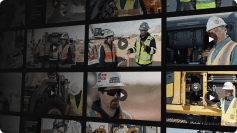Healthy Company Culture
Written by Jason Schroeder
January 16, 2022
Everyone's talking about the importance of good company culture . . . but what exactly is that?
Is it a super productive team working effectively together? Is it people laughing and joking around? Is it a conflict-free zone? Is it lots of great benefits, cool perks, and office outings?
As executive leaders, Randy Blount and Jason Schroeder are both passionate about creating good culture in their companies and in the Dirt World as a whole. They'll walk you through how company culture all comes down to how you treat your people.
What recruits really want
In 2017, one in five construction companies lost workers to another industry, and 70% were struggling to fill positions.1 Based on the workforce shortage, recruits aren’t rushing to the Dirt World.
Instead, they’re rushing to those other industries—like tech.
With high pay, remote and flexible work options, and sometimes outlandish perks, the tech industry throws out an attractive lure to workers.
Randy asks, “How do we compete with tech? How do we compete with these industries that are sexy right now, even though we aren't making the margins they make? We have to get a little bit creative.”
Now, if you’re starting to think about what creative workplace perks you can offer, hold your horses. That’s not where we’re going with this.
“Don't get me wrong, I love buying the foosball tables and the golf trips and the lunches and candy and stuff,” Jason says. “But at the end of the day I don't think that's what people are looking for.”
As Jason puts it, those perks are temporal. They’re short-term. And if you just offer short-term shiny objects, you’ll miss the mark. You won’t keep people long-term.
“Kids aren't looking for a masseuse every week at the office. They're looking to not waste their lives,” Jason says.
Living a life of meaning
Jason’s company, Elevate Construction, does boot camps for superintendents and project managers.
Almost every time, a veteran Dirt World leader stands up and says, “I've wasted the last 15 years of my life. I've ignored my family, I've chased the golden handcuffs, and I've really been off base.”
They also say, “Today it stops. Today I'm going to go home on time. Today I'm going to actually look my kids in the eye.”
Why does that matter when you’re trying to recruit people? Jason gives two reasons.
First, he says, “I don't think that the kids coming out of school are lazy. I don't think that they are different. I don't think that they're greedy. I think they have been told now long enough to not waste their time and their lives. They've been told to go live a life of meaning, and now they're listening and they're like, Where can I go work to live a life of meaning?””
Second, most people who have been in the industry a long time have worked hard and gritted through it for decades. Even though they were miserable, they want the next generation of workers to give the company that same blind loyalty.
In reality, the experienced leaders could have done a lot better if they just had a better culture.
Defining a healthy culture
“When I talk about culture, I'm talking about the common beliefs and actions of an organization,” Jason says.
Culture isn’t about trying to make everything fun. You can have fun, sure. But healthy culture is about creating a place where people have meaning and feel respected.
In the Dirt World, respect looks like:
- Paying people fairly
- Giving them responsibility and a challenging job
- Giving them the training and development that they want
- Showing that you care about their personal lives by giving them flexibility to deal with life events and take vacations without feeling guilty2
Respect will recruit workers for you
Leaders like to look at other companies’ programs or benefits. They say, “Toyota does 5S. That must be the secret.” Or, “Google has really nice offices. That’s why everyone wants to work there.”
And you know what? Those systems do work, and those offices are nice. But they don’t draw people in, inspire them to work hard, or retain them long-term.
Respect does.
Jason tells leaders, “There's no difference in the hard-workingness of the people nowadays as they were 15 or 20 years ago. They bust their butt.”
People aren’t lazy. They just don't want to work for companies where the culture isn't one of respect. As Jason bluntly puts it, “It’s not that people don’t want to work. It's that they don't want to work for you.”
So don't blame bad culture on people; instead, understand that it's up to you as their leader to create the good culture you're looking for.
How to give people meaning in their work
Respect is more than just treating people right—although that’s a good start. As Randy puts it, “Respect is recognizing I want value in my life. I want meaning in my life.”
Here are a few ways you can build a respectful, meaningful culture.
Set reasonable working hours
The next generation of the workforce is young. They’ve just realized they’re going to be working for the next 50 years. And they don’t want to spend 50 years working six days a week, pulling 10-12 hour shifts.
That’s not laziness. That’s common sense. That’s knowing that there’s more to life than work—like family and spending time with the people you love.
Randy says, “There's a few very large civil contractors that are well-known for [having a culture of] ‘You just gotta work 60 hours a week or else. If you're not working 60, then you're not going anywhere.’”
And companies with that attitude are losing people left and right.
When you respect, empower, and train people, they can be more productive in 40 hours than undertrained, unempowered, unhappy crews can be in 60 hours. And they actually want to work for you long-term.
Understand their values
Randy often meets with executives of other companies who complain that millennials don’t work hard—without realizing he is one.
Finally, he got tired of it.
So he told them, “The irony is that every one of you is a parent to the generation you say don't know how to work hard. So either they do, because all of you know how to work hard. Or you guys failed at teaching them how to work hard. I think the latter is not the case. They do know how to work hard, but their values are different.’”
Randy’s advice?
Embrace those different values, because that’s how you win in the Dirt World. You win when you have people—especially people who can lead.
Ask questions
You don’t have to sit around guessing how to show respect to younger workers. Just ask them. Say, “How can I demonstrate the respect you need?”
Once you understand that, all of a sudden you can have the best people.
“And generally, it doesn't cost you a lot more,” Randy adds.
That’s because most people won’t say, “Well for me to be respected, I need to be paid $20,000 above market rate.”
They’d love high pay, but all things being equal, that's not what motivates good employees. Good employees want to do meaningful work that helps society and gives them the freedom to live meaningful lives.
Books to help you build a healthy culture
You can learn a lot about creating a healthy, respectful company culture when you read books by people who have already done it. (Or listen to books, if that’s your thing.)
Here are some of Randy and Jason’s top picks:
- The Five Dysfunctions of a Team by Patrick Lencioni
- Great by Choice by Jim Collins
- The Great Game of Business by Jack Stack
- Traction: Get a Grip on Your Business by Gino Wickman
What happens when you start creating healthy culture
When you get clarity on your culture and how you plan to build it, you can engage employees. You can build successful teams and help your people achieve their growth goals. You can start winning with people.
When you’re winning with people, then you can start to win with business systems.
When you’re winning in business, then you can create a great incentive program.
Jason has seen companies succeed and build a great culture without increasing benefits or buying foosball tables. Eventually, they do those things—but that’s not where they start. They start by driving the company in a wonderful direction first.
Randy points out that Southwest Airlines outperformed their peers 10 times because of their culture.
He says, “Imagine as a contractor getting culture right and that being the catalyst to allow you to make all the other changes needed to outperform your peers by 10 times. That gives you a whole lot of opportunity.”
Culture is your job
Taking ownership of bad culture isn’t easy. It’s humbling. It’s also necessary.
Randy has read tons of leadership books and sat down with people like Jason and marketing expert Marcus Sheridan. Those things taught Randy how much culture, people, growing his knowledge, and working on himself impacts his company’s ability to perform. And as he’s learned to appreciate that, he’s grown as a leader.
Randy calls that process “a very humbling experience. I grew a business that was profitable. I probably had a little bit of pride, like I have this figured out. [So] this year has been incredibly humbling because I realized I have so much growth to do.”
That growth is also exciting for Randy—and it can be for you, too.
“It's so rewarding to sit with people like you and realize, If I can learn this much . . . imagine if the people listening start doing the things that we're demonstrating,” Randy says.
Imagine what it would be like if you modeled good culture and leadership—and then they started doing it, too. Where would your company be?
(Go ahead, picture it. We’ll wait.)
“As I think about culture, I think the opportunity you have as a leader is to work on yourself, improve yourself, and share that with others,” Randy says.
Takeaways
Jason and Randy shared some important insights, so let’s recap them here:
- People want respect.
- A healthy culture is a respectful culture.
- You can create a respectful culture by setting reasonable hours, understanding people’s values, asking questions, and learning from resources like the books Randy and Jason recommend.
Last but not least, remember that culture is the leader’s job. The good news is that, to quote Jocko Willink, “The ROI on leadership is unbounded. It's infinite.”
So it’s time to get stoked about how you and your team can become great leaders and create a healthy culture!















